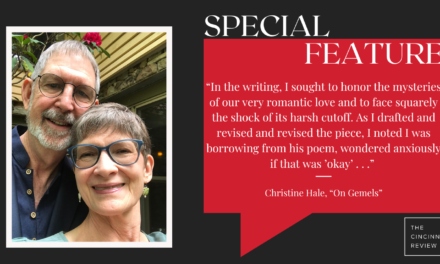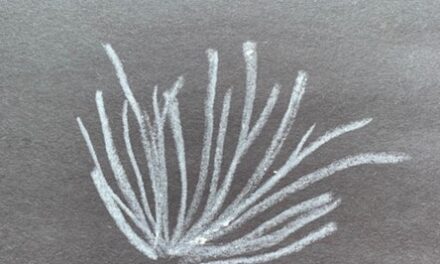Creative inspiration is often rooted in a w riter’s ability to be attentive to the moment. Frank Baum is a prime example: he’d tell improvised fairy-tales to his children, and after they’d fallen asleep, he’d jot down his stories in a notebook. Eventually, these revised fairy-tales became The Wizard of Oz. He expanded upon his world by incorporating into it many aspects of his life at the moment. For years, he’d had recurring nightmares about scarecrows. Perhaps he purged the terror by rendering his nocturnal antagonist as a kindhearted, sentient heap of hay and burlap. The origin of the name “Oz” exemplifies the inspirational importance of being attentive to the mundane details of our surroundings. One night, when Baum was reading to his children, he glanced across the room at a filing cabinet he’d built. He’d labeled the drawers alphabetically, one of them being, “O-Z.” Immediately, he knew his fictional world would be named Oz, and from there, his imagination filled in the details. The following contributor comments show how paying attention to conversations, physical surroundings, and one’s body can provide the impetus to creation.
riter’s ability to be attentive to the moment. Frank Baum is a prime example: he’d tell improvised fairy-tales to his children, and after they’d fallen asleep, he’d jot down his stories in a notebook. Eventually, these revised fairy-tales became The Wizard of Oz. He expanded upon his world by incorporating into it many aspects of his life at the moment. For years, he’d had recurring nightmares about scarecrows. Perhaps he purged the terror by rendering his nocturnal antagonist as a kindhearted, sentient heap of hay and burlap. The origin of the name “Oz” exemplifies the inspirational importance of being attentive to the mundane details of our surroundings. One night, when Baum was reading to his children, he glanced across the room at a filing cabinet he’d built. He’d labeled the drawers alphabetically, one of them being, “O-Z.” Immediately, he knew his fictional world would be named Oz, and from there, his imagination filled in the details. The following contributor comments show how paying attention to conversations, physical surroundings, and one’s body can provide the impetus to creation.
Karrie Higgins: “The Bottle City of God” began as a spin-off of another essay about my early experiences in Salt Lake City, entitled “Nowhere, No Place, Like Home” (published in Black Clock). In the Black Clock piece, air pollution played a minuscule part, but long after I finished that essay, I couldn’t shake the feeling that the air was my key to understanding Zion. As I studied and wrote about the complex chemistry of the pollution, I fell sick with asthma, and it felt magical, like I was writing my illness into being. Realizing how particulates had insinuated themselves inside my body changed my entire concept of self and place. I was carrying Zion inside me. The distinction between micro and macro evaporated. It was, to me, a kind of conversion. Joseph Smith received a revelation (Doctrine & Covenants 97:21) in which he declared Zion “the pure in heart.” To me, it described my asthma: I give my body to Zion, just like Zion gives its body (via the grid) to the City of God. In that sense, my sickness was a miracle. It made me part of the “at-ONE-ment” about which Hugh Nibley writes in “Temple and Cosmos.” This is going to sound super cheesy, but I also played Belinda Carlisle’s “Heaven on Earth” a bazillion times while writing “The Bottle City of God.” I even blasted it while taking walks through the thick, metallic-tasting smog. In the midst of the dreary, dark days of the Mother of all Inversions, I would dance around to that song and believe, really believe, that I was living in the earthly manifestation of heaven, that it was end times–and there was no time or place I would rather be.
John Warner: The origin of “Nelson v. the Mormon Smile” is in a conversation I had with former CR contributor Keith Lee Morris when we were colleagues at Clemson University. He alerted me to an article he read about the dangers of cellular waves while I related something from the news about how the aluminum in deodorant may be a contributor to Alzheimer’s. It was an odd conversation that I filed away for later use, wondering who I could get to say these things instead of a couple of middle-aged college instructors, and where they might say them. I settled on a couple of stoner snowboarders, Nelson and Jurgen having the conversation in a marketing research call center in Utah. Complications ensued and I just followed along to the end.
Holly Goddard Jones: My husband teaches interior design in High Point, North Carolina, which is home (surprisingly) to the biggest furniture industry trade show in the world. We went to a party once that was held by a designer, and it was an odd night, an odd mix of high class and low: this gorgeous house and some important people but also cheap wine and cheap eats and a fair number of nobodies like me and my husband. So that’s the genesis of the story’s major components, its location and situation. But the story’s real inspiration was my attempt to write about a thoughtless character. Thoughtlessness fascinates me. In my lifetime I’ve known a handful of people who act with an almost innocent sense of self-absorption and entitlement. It isn’t malicious, but it just doesn’t occur to them to consider how their actions affect others. With Eldon, I imagined this man who, in his pursuit of self-reinvention, is able to shed his loved ones like a coat that’s gone out of style and then wonders why he’s alone. Is there any way to make that man plausible? Could I make him a little bit sympathetic without transforming him into the kind of character I usually write about?










